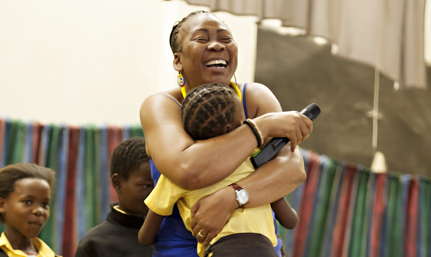Latest News Archive
Please select Category, Year, and then Month to display items
02 January 2025
|
Story Gerda-Marie van Rooyen
|
Photo Supplied
 Leading the research in South Africa is Prof Linus Franke from the Department of Soil, Crop and Climate Sciences.
Leading the research in South Africa is Prof Linus Franke from the Department of Soil, Crop and Climate Sciences.
Scientists are actively pursuing the successful breeding of diploid hybrid potatoes from inbred lines. This is expected to revolutionise potato breeding as it holds the key to rapid genetic progress. It will introduce new varieties for commercialisation through seed. Currently, existing potato variants have a gene that renders self-pollinated seeds infertile.
Prof Linus Franke, an academic in the Department of Soil, Crop and Climate Sciences at the UFS, is leading the research in South Africa. “This technology allows the production of genetically uniform potato seed that is easy to transport and largely disease-free.” He says this differs from conventional breeding whereby only vegetative propagation is possible due to tetraploid varieties in potatoes. It also risks carrying pests and diseases from one generation to the next – leading to the accumulation of pests and diseases with each round of multiplication.
Seed innovation
Prof Franke explains that Solynta BV, a seed company based in the Netherlands that produces potato varieties that can be grown from seed, has included South Africa in their research efforts because it is one of Africa’s largest producers and exporters. Through his academic relationship with Wageningen University and Research, a Dutch institution renowned for its agricultural endeavours and food production, the UFS became involved in researching hybrid potatoes grown from seed.
Diploid seeds containing two sets of chromosomes allow easier gene manipulation to increase predictability and speedier genetic progress. The breeding approach enables the incorporation of tolerance to pests, diseases, abiotic stresses (cold, heat, drought) and other desired genetic traits.
Although Prof Franke is optimistic about this research, he is not blind to disadvantages. “Potato seeds are tiny and have little energy reserves, making it harder to grow potatoes from seed than from tubers.” He says potatoes from seed will take longer to cultivate than tubers, as farmers need to grow plantlets from seeds first, adding six weeks to the growing period. “It is possible that commercial farmers can grow potatoes directly from seed. Alternatively, perhaps more likely, specialised growers will produce tubers of potatoes from seed; these tubers are then sold as seed tubers to other potato farmers, who then continue their normal practices of producing potatoes for the market from tubers.”
Financial benefits
Prof Franke says farmers have reason to get excited. “Seed potatoes will reduce input costs, as varieties with enhanced tolerance to pests and diseases require less pesticides. Planting one hectare of potatoes requires three to four tonnes of potato tubers, but only one 25 g packet of potato seeds.” Since potatoes are a more valuable commodity than maize, this technology might also increase farmers’ income potential.
Library opens new horizons for Bloemfontein-Oos School
2012-11-27
 |
Storyteller Gcina Mhlophe is hugging a learner at the Bloemfontein-Oos Intermediary School.
Photo: Kaleidoscope Photography
27 November 2012 |
“The more that you read, the more things you will know. The more that you learn, the more places you'll go.” Dr Seuss says that in his book I Can Read with My Eyes Shut!
It is hoped that this will also be the experience of learners at the Bloemfontein-Oos Intermediary School where a library has been stocked and unveiled with our assistance. Bloemfontein-Oos is one of the schools that the UFS renovated in partnership with the Free State Department of Education.
The learners also had the rare opportunity to listen to a doyenne of South African storytellers Gcina Mhlophe. She is one of the best storytellers, writers, publishers, directors and international poet.
Tessa Ndlovo, coordinator of the UFS Schools Partnership Programme, said she thought it was important for the school to have a library in order to cultivate a culture of reading. She asked publishers and libraries to send books and in the process, more than 2 000 books were donated by the UFS-Sasol Library, staff and students. New books were sent by publishing houses.
The office of Prof. Jonathan Jansen, Vice-Chancellor and Rector, sponsored the renovation of the library by donating shelves.
Bloemfontein-Oos became the first school in the UFS’s Extreme Makeover intervention. Attention has been given to fencing, electrification, renovation and the bathrooms. Three truckloads of furniture were donated and more will follow in future. The Calculator Project (Project of Peace) was introduced to the school by students from the United States of America.
The library is part of the Culture of Reading Project.